Can Dogs Eat Cashews?
14.01.2021.
Cashew nuts are popular and tasty treats we as humans adore. If you have a dog, you probably noticed that your dog would like to snack on anything you are snacking, but first, you should find out if your dog can eat cashew nuts.
The shortest possible answer would be - yes. Cashew nuts are safe for dogs. However, there are some things you should know before feeding your dog this delightful little nut.
We snooped around a bit and found out everything you need to know about feeding your dog cashews. Let's dig in.
Are cashew nuts safe for dogs?
Unlike many other nuts, cashew nuts are safe for your dog to eat. They are rich in protein and "good" fat. They are tasty and full of fiber, which is a crucial part of a healthy dog diet. That's not all; cashews are full of beneficial nutrients that can do wonders for your dog's health. Here are some of the best parts.
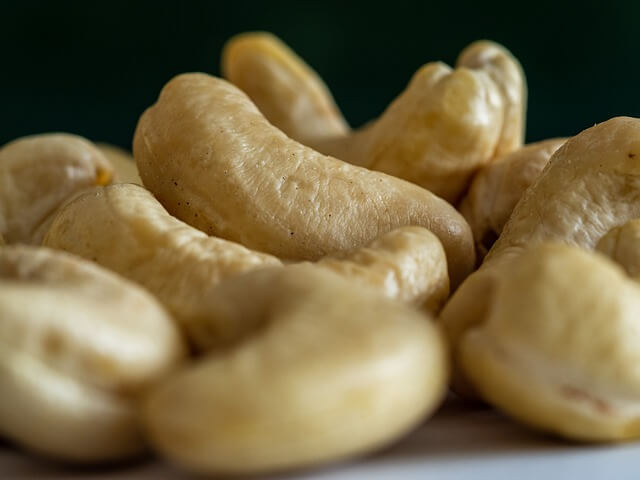
Benefits dogs get from cashew nuts
Besides being delicious, cashew nuts are packed with things that are beneficial to you and your dog's bodies. The best parts of the cashew nuts are;
High fiber value
High fiber content is excellent, especially for those that have bowel movement problems. Fiber hardens the stool, which is very important for your dog's health. A soft stool can affect a dog's anal glands, which will create a whole different set of problems.
High protein value
Most of us know that protein is essential in every diet, but we were not entirely sure why. Protein is necessary because it is made of amino acids, which our bodies use for muscle and tissue repair, and they are a great energy source.
High fat value
Although most of us think fat is bad, it is also an essential part of a healthy diet. Fat contains fatty acids, which help our dog's bodies absorb vitamins. Vitamin A, D, and E are fat-soluble, which means they can only be fully absorbed with the help of fatty acids. However, you shouldn't overfeed your dog with high-fat foods because fat contributes to obesity.
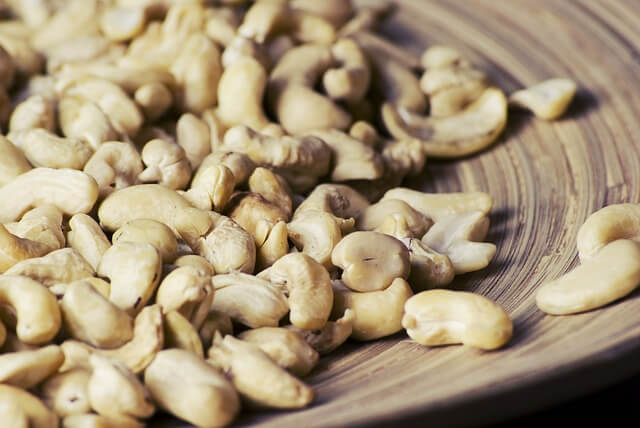
Elements in traces
Our dog's body needs natural elements that help them function properly. Cashew nuts are full of zinc, magnesium, and copper.
- Zinc - Zinc is one of our dog's strongest allies in fighting diseases. It helps fight off viruses and bacteria, and it is used for DNA production.
- Magnesium - Magnesium is one of the most critical elements all our bodies need. It plays a vital role in controlling blood sugar levels and proper nerve and muscle function.
- Copper - There are plenty of functions copper is a vital part of. It helps form red blood cells, keeps bones, nerves, and vessels healthy. Plus, recent studies show that it helps prevent cardiovascular diseases and osteoporosis.
Can dogs eat watermelon? You can read all about it here - Can Dogs Eat Watermelon?
Can they be harmful for dogs?
There are some situations where cashew nuts can present a threat to your dog. It is impossible to know how your dog will react to cashew nuts until you actually give them some. As a general rule, start with a small amount, and see how your dog reacts. If you don't notice anything wrong with your dog, it is safe to feed them more cashews. However, here are some things you should look out for.
Stay away from salted cashews
Salted cashew nuts might be tasty, but they are not healthy for your dog. A dog's body cannot handle high levels of sodium. Too much sodium can cause gastrointestinal problems and dehydration. If you decide to give your dog cashews, make sure they are plain and unsalted.
Overfeeding
This is the rule that goes for humans and dogs - overfeeding on one thing is not healthy. In small amounts, fat might be beneficial, but overfeeding your dog, especially if they are already chubbier, is not healthy. It might lead to obesity and pancreatitis.
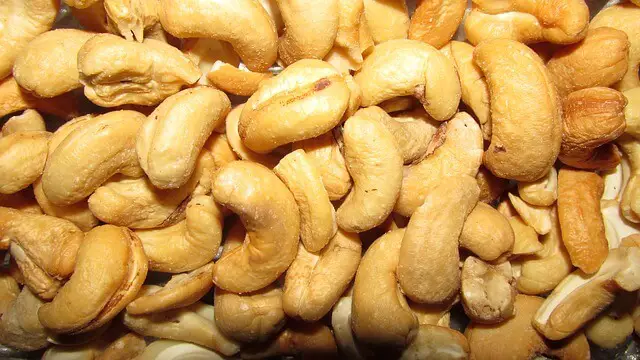
Allergic reaction
You have to be careful when you are introducing new foods to your dog's diet. Introduce it carefully, and only a small amount at first. Keep a close eye on your dog's reaction and look for any signs of an allergic reaction. Allergy signs are:
- Swelling
- Itching
- Redness of skin
- Heaving
Other signs can point to stomach issues that are pretty clear and easy to notice. If your dog starts vomiting or gets diarrhea, it is a clear sign they cannot handle their cashew nuts.
Do you know if broccoli is safe for your dog? You can learn all you need to know about giving your dog broccoli in this article - Can Dogs Eat Broccoli?
How should you give your dog cashews?
Generally, feeding your dog cashew nuts is safe if your dog's stomach can process them, and your dog likes them. You only need to follow these two rules;
1. Only plain, unsalted cashews
For all the reasons we mentioned above, you should only feed your dog unsalted cashew nuts. All added ingredients might be tasty for you, but your dog can get in a lot of trouble.
2. Avoid mixed bags
Like humans with allergies, dogs can suffer from them, and only the tiniest exposure is enough to get a painful and life-threatening reaction. While cashew nuts are safe, other nuts might not be. To be completely safe, avoid feeding your dog cashews from a bag of mixed nuts.
Keep their cashew intake controlled, and don't overfeed your dog. Treats should not make over 10% of your dog's daily diet, so keep that in mind when feeding your dog, these nutty treats.
It is also essential to know which nuts are toxic for your dog, so here is something you should remember;
- Pecans
- Walnuts
- Hickory
- Macadamia
Ever think about giving your dog raw meat? Here is an article that can tell you a bit more about raw diet - Can Dogs Eat Raw Chicken?
In short
Cashews can be a delightful treat your dog will adore. If you want to introduce these treats to your dog's diet:
- Start slow and give them small amounts.
- Look for their reaction, and if you don't notice bad reactions, feel free to give your dog unsalted cashew nuts.
- Keep the amount low, and your dog will remain healthy and happy.
World Dog Finder team

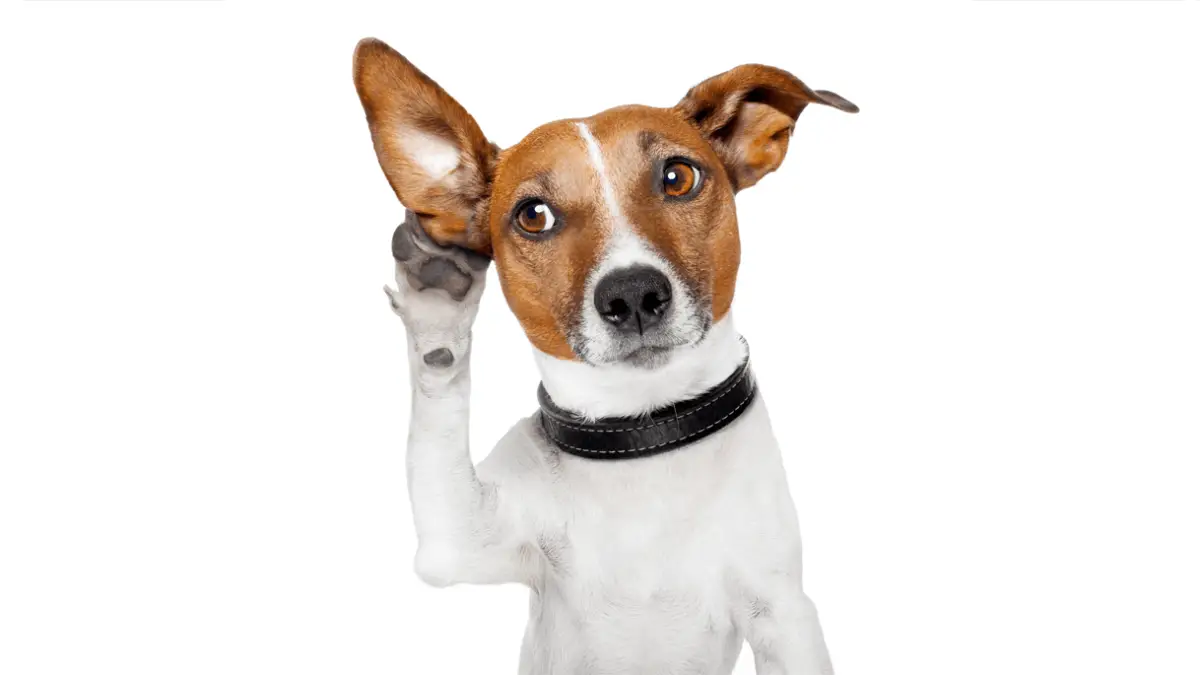


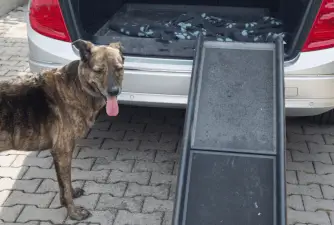


Share